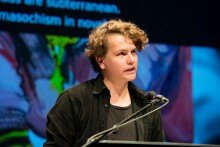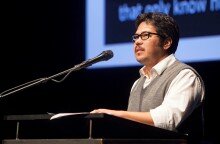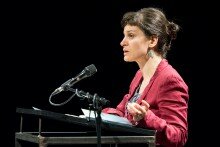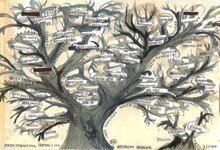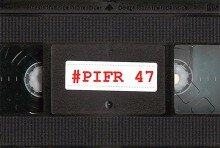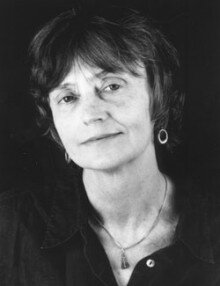
Alice Notley is one of America’s greatest living poets. She has long written in narrative and epic and genre-bending modes to discover new ways to explore the nature of the self and the social and cultural importance of disobedience. In an interview with the Kenyon Review, Notley noted: “I think I try with my poems to create a beginning space. I always seem to be erasing and starting over, rather than picking up where I left off, even if I wind up taking up the same themes. This is probably one reason that I change form and style so much, out of a desire to find a new beginning, which is always the true beginning.”
Notley was born in Arizona and grew up in Needles, California. After earning her MFA from the Iowa Writers’ Workshop, Notley traveled extensively around the U.S. and abroad. She met the poet Ted Berrigan, and the couple lived in Southampton, New York (in the garage of painter Larry Rivers); Manhattan; Providence, Rhode Island; and Bolinas, California. In 1972, Berrigan and Notley married and moved to Chicago, where they lived until 1976. She had two sons with him, the poets Edmund and Anselm Berrigan.
Active in the New York poetry scene of the 1960s-70s, Notley is often identified with the Second Generation New York School poets, though her work resists any period classification. Referring back to her writing in the 1970s in an interview with the Ampersand Review, Notley says she felt she was “the only poet I knew of who used the details of pregnancy and motherhood as a direct, pervading subject in poems, on a daily basis, as if it were true that half the people in the world gave birth to others and everyone had been born.” In other poems, Notley borrows images and inspirations from popular culture (Muhammed Ali, Marlon Brando, even comic books), as well as literature and Greek mythology.
In much of Notley’s work, details from daily life enter in fragments that can be both entertaining (“Lie down in / your own bed, in the room where Momma found a scorpion” from “The Anthology”) and jarringly serious, as in these lines from “Stalker”:
trustworthy: someone’s lying . . . about a
fight between a teenage girl and boy – he pushed
her hard –
In the spring of 1976, Notley and her family returned to New York, and her husband Ted fell ill with hepatitis, a disease he suffered from until his death in 1983. After having befriended the British poet and novelist Douglas Oliver during an earlier trip to England, Notley later reconnected with him, marrying in 1988 and moving to Paris in 1992. Notley’s writing at this time begins to shift away from singular poems and toward book-length projects with overarching styles and themes. In an important essay titled “The Poetics of Disobedience,” Notley says this shift began with her book The Descent of Alette (1992). She describes it as “an immense act of rebellion against dominant social forces, against the fragmented forms of modern poetry, against the way a poem was supposed to look according to both past and contemporary practice.” The narrator, Alette, finds herself in a feminist epic, on a subway, traveling deeper and deeper in the tunnels, into an underworld filled with caves and otherworldly characters. The text is visually striking with quotation marks surrounding each poetic foot, intended to slow the reader down and indicate the pace at which the book is to be read.
Mysteries of Small Houses (1998), which won the Los Angeles Times Book Prize, is an experiment with the autobiographical mode, in which Notley “was firstly trying to realize the first person singular as fully and nakedly as possible.” Her subsequent book, Disobedience (2001), winner of the Griffin International Poetry Prize, heads in the opposite direction, showing disobedience to the notions of truth and reality, featuring comic confrontations with reoccurring characters like Robert Mitch-ham, a man that closely resembles the actor Robert Mitchum. Recent books continue to be at least somewhat character centered. Culture of One (2011) sees Notley returning to the desert of her childhood to tell the story of one of its residents. This “novel in poems,” as its jacket copy describes it, covers the life of Marie, a woman who lives in a shack in the town dump. With Songs and Stories of the Ghouls (2011), Notley once again takes on the challenge of creating a feminist epic. In reframing and re-empowering Dido and Medea, she creates a meditation on destruction.
Much of Notley’s new work is filled with a multitude of voices, particularly the voices of the deceased, which appear explicitly in poems like “Are Loyal” and “Iconography”. Even in recent poems without clearly defined speakers, one often gets the sense they’re reading many voices. In “This Fire”, thoughts are interrupted, extended, and contradicted:
These outposts where I grew up; I didn’t do that
I have no . . . identity, and the love is an object
to kick as you walk on the blazing bare ground, where . . .
sentimental, when what I love, I . . . don’t have that one
word. This fire all there is . . . to find . . . I find it
You have to find it. It isn’t love, it’s what?
In an interview with Adam Plunkett, Notley said,
Why the dead continue to speak, and why Notley is so intent on presenting their voices, is answered aptly in her poem “To a New Sex:”
Enter my head
if you wish. No ends or purposes
Prevailed fortunes. I have a destiny. My death
will not complete it.
Notley is the author of over 25 books of poetry, as well as the autobiography Tell Me Again (1982), the play Anne’s White Glove (1985), and a book of essays on poets and poetry, Coming After (2005). She edited and wrote the introduction for the reissue of Ted Berrigan’s The Sonnets (2000), as well as editing, with her sons, The Collected Poems of Ted Berrigan (2005). Her honors and awards include an Arts and Letters Award from the American Academy of Arts and Letters and the Shelley Memorial Award from the Poetry Society of America. She has also been a finalist for the Pulitzer Prize. Notley continues to live in Paris and makes frequent trips to the U.S. to give readings and lectures. In 2015, she was awarded the Ruth Lilly Poetry Prize from the Poetry Foundation.
Selected Bibliography
Poetry
Benediction, Letter Machine Editions, Tucson, 2015
Negativity’s Kiss, Presses Universitaires de Rouen et du Havre, Mont-Saint-Aignan, 2014
Songs and Stories of the Ghouls, Wesleyan University Press, Middletown CT, 2011
Culture of One, Penguin Books, New York, 2011
Reason and Other Women, Chax Press, Tucson, 2010
Grave of Light: New and Selected Poems, Wesleyan University Press, Middletown CT, 2006
In the Pines, Penguin, New York, 2007
Alma, or The Dead Women, Granary Books, New York, 2006
From the Beginning, Owl Press, Woodacre, 2005
Waltzing Matilda, Kulchur Foundaiton, New york, 1981
Disobedience, Penguin Books, New York, 2001
Byzantine Parables, Peter Riley, Cambridge, 1998
Mysteries of Small Houses, Penguin, New York, 1998
The Descent of Alette, Penuin, New York, 1996
Close to Me & Closer (The language of heaven); and Desamere, O Books, Oakland, 1995
Selected Poems of Alice Notley, Talisman House, Hoboken New Jersey, 1993
To Say You, Pyramid Atlantic, Riverdale, 1994
At Night the States, Yellow Press, Chicago, 1987
Parts of a Wedding, Unimproved Editions Press, 1986
Sorrento, Sherwood Press, Los Angeles, 1984
When I Was Alive, Vehicle Editions, New York City, 1980
How Spring Comes, Toothpaste Press, Iowa, 1981
165 Meeting House Lane, “C” Press, 1971
Phoebe Light, Big Sky Books, Bolinas, 1973
Incidentals in the Day World, Angel Hair Books, New York, 1973
For Frank O'Hara's Birthday, Street Editions, Cambridge, England, 1976
Alice Ordered Me to Be Made, Yellow Press, Chicago, 1976
A Diamond Necklace, Frontward Books, New York, 1977
Songs for the Unborn Second Baby, United Artists, Lenox, Massachusetts, 1979
Other
Coming After: Essays on Poetry, University of Michigan Press, Ann Arbor, 2005
Tell Me Again, Am Here Books/Immediate Editions, Santa Barbara, 1982
Links
“The Poetics of Disobedience” by Alice Notley, PoetryFoundation.org
“Alice Notley 101” by Benjamin Voigt, PoetryFoundation.org
“No Doctrines” by Don Share, Poetry magazine
“Talk to the Dead” by Adam Plunkett, PoetryFoundation.org
“Poetry Off the Shelf: Alice Notley”, PoetryFoundation.org (audio)
“As Good As Anything” by Alice Notley, PoetryFoundation.org (audio)
“At Night the States” by Alice Notley, PoetryFoundation.org (audio)
“Congratulating Wedge” by Alice Notley, PoetryFoundation.org (audio)
“From ‘White Phosphorus’ (excerpt)” by Alice Notley, PoetryFoundation.org (audio)
“Requiem for the First Half of Split” by Alice Notley, PoetryFoundation.org (audio)
“The Ten Best Issues of Comic Books” by Alice Notley, PoetryFoundation.org (audio)
“Democracy at 10th & A: A Discussion of Alice Notley’s poem ‘I the People’’, PoetryFoundation.org (audio)
“Gift” by Alice Notley, PoetryFoundation.org (audio)
“Poetry Magazine Podcast: July/August 2015”, PoetryFoundation.org (audio)
“Evident Being: A Conversation with Alice Notley” by David Baker, Kenyon Review
“A Quick Interview with Alice Notley” by Corey Zeller, Ampersand Review



